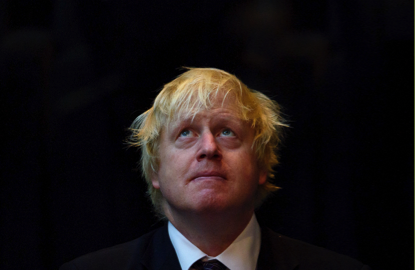
(July 1): In three hours on Thursday morning, British politics was turned on its head. Again.
The latest victim of the inferno that has ripped through Westminster for the past seven days was the man most responsible for getting the fire started: Boris Johnson, former mayor of London -- and, now, former next prime minister of Britain.
Johnson, who as a child wanted to be “World King,” had positioned himself as the favorite to succeed David Cameron when he challenged the premier by coming out for Brexit in February. His energy and charisma delivered victory -- and Cameron’s resignation. When he awoke today, the deadline for declaring his candidacy to succeed his old schoolmate, the path to 10 Downing Street was clear. By noon, he was out of the race.
Instead, there’s a five-person contest in which the two frontrunners were on opposite sides of the June 23 referendum on whether to quit the European Union, the event that set off the political earthquake whose aftershocks continue to hit. Johnson’s downfall resulted from former allies’ doubts that he was competent to complete the Brexit process.
The meeting that decided his fate took place just before 9 a.m. in the House of Commons office of Justice Secretary Michael Gove. At the hastily called gathering, Gove told about 10 fellow members of Parliament he had no confidence in Johnson, whose campaign he was supposed to be supporting that morning.
‘Step Up’
“He told us he’d decided he was going to stand,” Culture Minister Ed Vaizey told reporters. “The closer we got, the harder he thought about it. Michael’s logic is that if he doesn’t think Boris can do it, he’s got to step up to the plate.”
The room was stunned. Among those present was Dominic Raab, one of Gove’s junior ministers, who was in the unfortunate position of having written a pro-Johnson op-ed for that morning’s Sun newspaper, headlined “Why Boris has the Heineken effect” -- a reference to the beer’s slogan that it “refreshes the parts other beers cannot reach.” But he was swift to move in behind Gove -- giving television interviews supporting his boss by lunchtime.
Leaked E-mail
The first public sign of trouble had come on Wednesday when an e-mail to Gove from his wife Sarah was leaked, urging him to seek “SPECIFIC assurances” in a meeting with Johnson and “be your stubborn best.”
Gove says he’d lost confidence in Johnson since the Brexit vote. Efforts to get him to win over other key players in the Tory Party failed, leading to a much wider field than expected. Energy Minister Andrea Leadsom was among those that Gove had hoped Johnson could win to his team, according to a person familiar with Gove’s thinking. After meeting Johnson, she decided to run against him.
“During the course of the last few days, I’ve realised that while Boris does have those very special abilities to communicate and to reach out, what he did not have was the capacity to build and to lead that team and to provide the leadership the country needs,” Gove, 48, told the BBC.
‘Grown-Up Candidate’
Gove’s earlier announcement came just as Home Secretary Theresa May was preparing her own 9:30 a.m. launch. It could not have been timed better for her. While the former allies were knifing each other, unable to say what leaving the EU was going to look like, May appeared to announce, in the words of Johnson’s biographer Andrew Gimson, that here was “the grown-up candidate.”
May, who supported Cameron’s campaign to stay in the EU, had a plan. Her speech showed commitment to follow the vox populi. She said that there would be no second referendum, no early election, and she sounded like she meant it. She made serious points at Johnson’s expense, saying the country needed “strong leadership and a clear sense of direction,” and she made jokes at Johnson’s expense: “The last time he did a negotiation with the Germans, he came back with three nearly new water cannon.” Weighty, firm, funny -- the many male Tory lawmakers in the room could have been forgiven for thinking of a previous Conservative leader, Margaret Thatcher.
With May up and running, journalists strolled through the London sunshine to Johnson’s launch. It’s never a good sign if the first question everyone asks on arrival is: “Is it still happening?” But it’s a worse sign if the only answer is: “There’s tea and coffee over there.”
Where Is Everyone?
When the door eventually opened, there were clues something was wrong. There was no banner, no slogan. There were no senior Tory lawmakers -- they were elsewhere, declaring for Gove and May.
Eventually, Johnson appeared. He told the room about the great things he had done as mayor. But was he going to run? He talked about the qualities the next prime minister would need. But was he going to run?
“Having consulted colleagues and in view of the circumstances in Parliament,” he said. “I have concluded that person cannot be me.”
In 2005, Gove and Johnson backed Cameron to be the next Tory leader. He was going to get the party past its obsession with Europe, and restore its reputation for economic competence. Eleven years later, Britain is heading out of the EU, the Tory party is split, and the country may be heading for a Brexit recession. One man is still standing, having turned on first Cameron, and then Johnson.
“It’s been an astonishing day,” said Tim Bale, author of “The Conservatives From Thatcher to Cameron.” “And out of that cast of characters, who would have expected that it would be Michael Gove who would be the one left with a chance of being prime minister?”